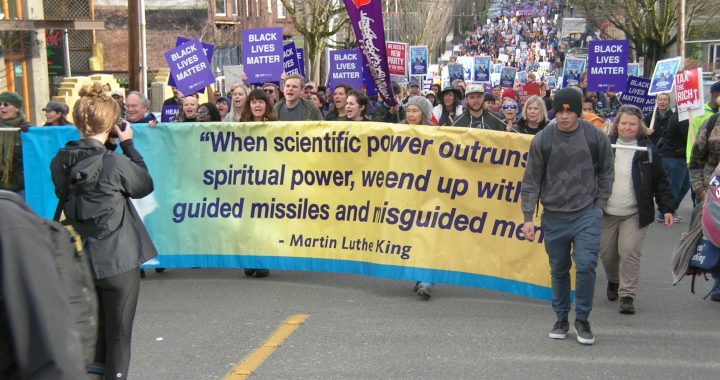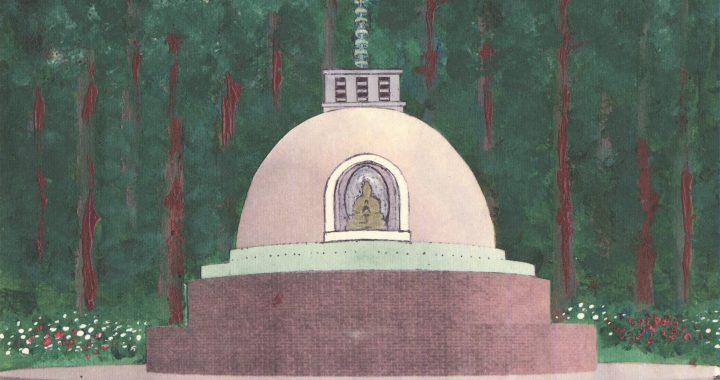Every year Ground Zero Center for Nonviolent Action honors the memory of Martin Luther King, Jr. around the anniversary of his birthday.
Just what does an organization working to abolish nuclear weapons have in common with Dr. King? Perhaps this quote from Dr. King sums it up best: “When scientific power outruns moral power, we end up with guided missiles and misguided men”. Dr. King speaks to the root – or what could be called the taproot – of violence in the hearts of human beings that spurs “scientific power” to “outrun moral power,” thereby holding all humanity under the threat of nuclear annihilation.
Dr. King is widely known as a civil rights leader – battling segregation and marching for equal rights. Yet after the passage of the Civil Rights Acts in 1964 Dr. King began challenging our nation’s fundamental priorities. He maintained that the civil rights laws meant nothing without human rights, including economic rights. He spoke out against the huge gaps between rich and poor, and called for “radical changes in the structure of our society” to redistribute wealth and power. 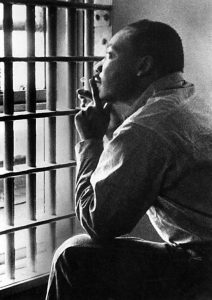
Dr. King did not suddenly become an opponent of war (and nuclear weapons) once the major civil rights struggle was over. As early as 1954 he said in one of his sermons that “the great danger facing us today is not so much the atomic bomb that was created by physical science. Not so much the atomic bomb that you can put in an airplane and drop on the heads of hundreds and thousands of people – as dangerous as that is. But the real danger confronting civilization today is that atomic bomb which lies in the hearts and souls of men, capable of exploding into the vilest of hate and into the most damaging selfishness – that’s the atomic bomb we’ve got to fear today.”
Dr. King understood that the overt manifestations of violence – war and nuclear weapons – were deadly symptoms of a much deeper malady of the human heart. He understood violence all too well, both through experiencing it firsthand and through a deep study of Christian and Gandhian nonviolence.
By 1967 Dr. King had become one of the country’s most prominent opponents of the Vietnam War as well as a staunch critic of overall foreign policy. He spoke of the difficulty of working for peace in an atmosphere of mass conformity. “Even when pressed by the demands of inner truth, men [sic] do not easily assume the task of opposing their government’s policy, especially in time of war. Nor does the human spirit move without great difficulty against all the apathy of conformist thought within one’s own bosom and in the surrounding world. Moreover, when the issues at hand seem as perplexing as they often do in the case of this dreadful conflict, we are always on the verge of being mesmerized by uncertainty. But we must move on.”
He went on to say that, “the calling to speak is often a vocation of agony, but we must speak. We must speak with all the humility that is appropriate to our limited vision, but we must speak.” There is no other choice for us, because, “silence is betrayal.”
Dr. King saw the connection between war and the evisceration of social programs in this country. He “knew that [the U.S.] would never invest the necessary funds or energies in rehabilitation of its poor so long as adventures like [Iraq and Afghanistan] continued to draw men and skills and money like some demonic, destructive suction tube.” Dr. King saw “war as an enemy of the poor”.
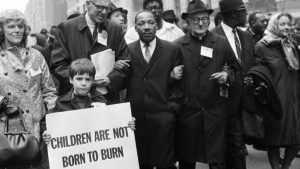 Dr. King spoke of “a far deeper malady within the American spirit” that, of course, is greed. He said that it is our “refusing to give up the privileges and the pleasures that come from the immense profits of overseas investments” that governs our foreign policy, and makes the U.S. the “greatest purveyor of violence in the world today.” He called for a “radical revolution of values” wherein we “shift from a thing-oriented society to a person-oriented society.” He said that playing “the Good Samaritan on life’s roadside… will be only an initial act. One day we must come to see that the whole must be transformed so that men and women will not be constantly beaten and robbed as they make their journey on life’s highway. True compassion is more than flinging a coin to a beggar. It comes to see that an edifice which produces beggars needs restructuring.”
Dr. King spoke of “a far deeper malady within the American spirit” that, of course, is greed. He said that it is our “refusing to give up the privileges and the pleasures that come from the immense profits of overseas investments” that governs our foreign policy, and makes the U.S. the “greatest purveyor of violence in the world today.” He called for a “radical revolution of values” wherein we “shift from a thing-oriented society to a person-oriented society.” He said that playing “the Good Samaritan on life’s roadside… will be only an initial act. One day we must come to see that the whole must be transformed so that men and women will not be constantly beaten and robbed as they make their journey on life’s highway. True compassion is more than flinging a coin to a beggar. It comes to see that an edifice which produces beggars needs restructuring.”
As a true modern-day prophet Dr. King was not afraid to warn people in the U.S. that, “a nation that continues year after year to spend more money on military defense than on programs of social uplift is approaching spiritual death.” He hammered away at the need for everyone to speak out and use the most creative methods of protest possible, not just against the war, but also for “significant and profound change in American life and policy.” He believed that, “Our only hope today lies in our ability to recapture the revolutionary spirit and go out into a sometimes hostile world declaring eternal hostility to poverty, racism, and militarism.”
Ground Zero Center for Nonviolent Action has, for over 4 decades, carried on in the spirit of nonviolent direct action as we, too, seek “to keep the world from committing the suicide of nuclear war.” In a grand experiment in truth we “explore the meaning and practice of nonviolence from a perspective of deep spiritual reflection, providing a means for witnessing to and resisting all nuclear weapons” (from Ground Zero’s mission statement).
Michael Honey, in his book “Going Down the Jericho Road”, spoke to Dr. King’s commitment to nonviolent direct action in a passage about James Lawson, who worked closely with King. “Like King, he [Lawson] spoke of ‘soul force’ or satyagraha, as the crucial ingredient needed to keep the world from committing the suicide of nuclear war and to defeat racism. For him, pacifism meant: ‘We will make the choice according to the methods that we use, not according to the ends that we seek.’” 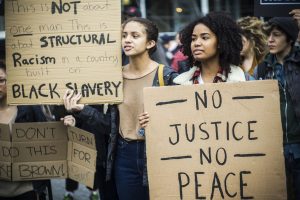
For me that statement goes to the heart of Ground Zero. Although we seek an end to nuclear weapons, the end(s) do not justify just any means. We understand the dangers of compromising the spirit of nonviolence in order to hasten the process. We understand that we may not see the fruits of our labors in our lifetime(s), yet we continue speaking out and resisting nonviolently, unabated in the struggle, knowing that the alternative is unspeakable. There is no other choice for us because “silence is betrayal” [to future generations].
This is a month of great tensions. Our nation has finally been shocked into facing down centuries of our ugly history even as we celebrate the anniversary of the birth of a prophet and the Treaty on the Prohibition of Nuclear Weapons. The challenges ahead of us are enormous on every level. And so, this is a time to rededicate ourselves to the long struggle to tear down the artificial and destructive divisions that separate us and have let one group dominate another. If we can navigate this fork in the road we have the opportunity to build on Dr. King’s vision of a better world. Each of us has a part to play in this journey.
With this in mind, it seems appropriate for Dr. King to have the last word, something to create a broad perspective for us to live into:
Through our scientific and technological genius, we have made of this world a neighborhood and yet we have not had the ethical commitment to make of it a brotherhood [and sisterhood]. But somehow, and in some way, we have got to do this. We must all learn to live together as brothers [and sisters] or we will all perish together as fools. We are tied together in the single garment of destiny, caught in an inescapable network of mutuality. And whatever affects one directly affects all indirectly. For some strange reason I can never be what I ought to be until you are what you ought to be. And you can never be what you ought to be until I am what I ought to be. This is the way God’s universe is made; this is the way it is structured. – Martin Luther King, Jr., Remaining Awake Through a Great Revolution, June 2, 1959

